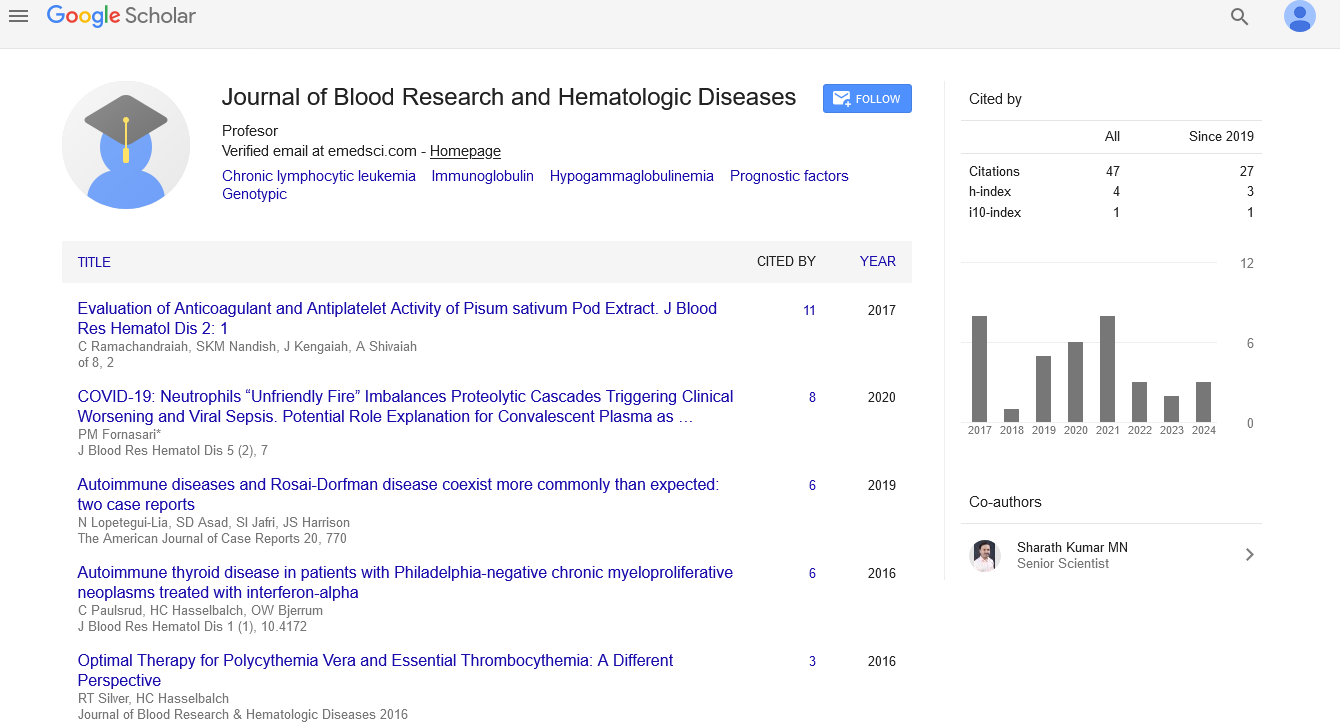Commentary, J Blood Res Hematol Dis Vol: 8 Issue: 1
Importance of Blood Count in Medical Diagnosis
Yun Chan*
Department of Medicine, Stanford University, Palo Alto, USA
*Corresponding Author: Yun Chan
Department of Medicine, Stanford University,
Palo Alto, USA
E-mail: yunchan@hotmail.com
Received date: 03-Mar-2023, Manuscript No. JBRHD-23-95438;
Editor assigned date: 06-Mar-2023, PreQC No. JBRHD-23-95438 (PQ);
Reviewed date: 20-Mar-2023, QC No. JBRHD-23-95438;
Revised date: 27-Mar-2023, Manuscript No. JBRHD-23-95438 (R);
Published date: 06-Apr-2023, DOI: 10.4172/jbrhd.1000161.
Citation: Chan Y (2023) Importance of Blood Count in Medical Diagnosis. J Blood Res Hematol Dis 8:1.
Description
A Complete Blood Count (CBC) is a laboratory test that determines the quantity and quality of various blood components. The test evaluates red blood cells, white blood cells, and platelets. A complete blood count is a standard test used to check for a variety of medical disorders and to track various medical treatments. The CBC is a reasonably basic test that is normally performed with a little blood sample obtained via venipuncture. The blood is delivered to a laboratory, where it is processed using automated technology. The test results are usually available within a few hours.
The CBC gives vital information about a person's overall health and can aid in the diagnosis of a number of medical disorders.
Some of the CBC's important components
CBC stands for Complete Blood Count, which is a blood test that measures various components of blood. The CBC typically includes several important components, including:
Red Blood Cells (RBCs): RBCs are in charge of transporting oxygen throughout the body. A CBC counts the number of RBCs in a person's blood as well as their size and shape. RBC abnormalities may suggest anemia, a condition in which there are insufficient RBCs, or other blood problems.
White Blood Cells (WBCs): WBCs are an important component of the immune system that aid in the fight against infections. A Complete Blood Count (CBC) determines the number and type of WBCs in a person's blood. WBC levels that are high can suggest infection, inflammation, or leukemia, whereas WBC numbers that are low can indicate bone marrow abnormalities or viral infections.
Platelets: Platelets are in charge of blood clotting. A Complete Blood Count (CBC) determines the quantity of platelets in a person's blood. Platelet counts that are low can suggest bleeding issues, whereas platelet counts that are high can indicate bone marrow diseases or other medical conditions.
Hemoglobin (Hb): Hemoglobin is a protein found in red blood cells that transports oxygen. A complete blood count determines the amount of haemoglobin in a person's blood. Low haemoglobin levels can be indicative of anemia, whilst high levels can be indicative of dehydration or other medical issues.
Hematocrit (Hct): Hematocrit is a measurement of the proportion of blood made up of RBCs. A CBC determines a person's hematocrit level in their blood. Anemia can be indicated by low hematocrit levels, whereas high levels can be caused by dehydration or other medical disorders.
MCV (Mean Corpuscular Volume): MCV is a measurement of RBC size. The MCV level in a person's blood is measured via CBC. Anemia or other blood diseases might be indicated by abnormal MCV levels.
A CBC may also include other tests such as a differential white blood cell count, which measures the percentage of distinct types of WBCs in a person's blood, and a reticulocyte count, which counts the amount of young RBCs in a person's blood, in addition to these values.
The CBC is an important diagnostic test that can assist healthcare providers in identifying a variety of medical disorders. It is commonly used to screen for anemia, infection, and other blood abnormalities, as well as to assess the success of some medical therapies. A CBC, for example, may be performed before and after chemotherapy to assess the treatment's influence on a person's blood cells.
A CBC is not a definitive diagnostic technique and should be used in conjunction with other diagnostic procedures and clinical assessments. Abnormal CBC levels may necessitate additional tests to confirm a diagnosis.
A complete blood count is a basic laboratory test that offers important information about a person's general health. It assesses the quantity and quality of blood components such as RBCs, WBCs, platelets, hemoglobin, hematocrit, and MCV.
